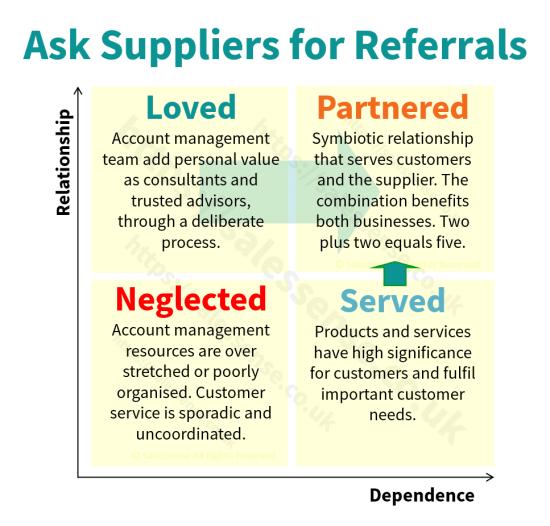Do you ask suppliers for referrals?

Your suppliers want your goodwill. Supplier referrals could be an immediate source of new business.
How many suppliers do you have?
Do you have a named contact or account manager for any of them? If you are an important customer for a supplier, you probably have an account manager.
You should already have the names and contact details of the account managers representing your suppliers.
They have a vested interest in your success.
Supplier account managers will not want to say no. So phone them and say, "I'd like to ask for your help."
Wait for a yes.
Say, "Would you be willing to make some recommendations on companies that could benefit from what we sell?"
This is likely to result in some discussion of what you sell and how customers benefit.
Turn the conversation to the businesses they know.
Say, "In your role, you must speak with many businesses."
Ask, "Who do you know well in - town/area/county/region?"
Encourage discussion of specific companies that the account manager is responsible for.
Ask, "How do they do <whatever it is that what you sell does for customers>?"
When you have identified one or more likely prospects ask, "Would you introduce me?"
You probably know businesses that need what your suppliers sell.
This conversation could easily become a mutually beneficial exchange of introductions.
Could this work for you?
Here is a detailed guide for getting supplier referrals:
Supplier referrals are a strategy where current suppliers recommend potential new customers or business partners to a company. This practice leverages the supplier's network and industry knowledge to identify other businesses that can benefit from the company's products and services, Here are additional aspects of setting up a supplier referrals programme:
How Supplier Referrals of Sales Prospects Work
Referral Programmes: Companies may establish formal supplier referral programmes that incentivise current suppliers to refer or introduce potential new customers.
Incentives: Suppliers can be incentivised for successful referrals. In addition to the goodwill created, incentives can include bilateral referrals, financial rewards, extended contracts, and preferred vendor status.
Referral Process: Suppliers can be encouraged to suggest prospects and make referrals in regular meetings with buying and sales staff. A referral can be as simple as providing contact details or involve a personal introduction. Supplier account managers may also be able to provide intelligence about a referral organisation's structure and business imperatives.
Follow-Up: The company follows up with the referred potential customers, introducing them to the company’s products or services and attempting to convert them into paying clients.
Benefits of Supplier Referrals
Expanded Customer Base: Suppliers can help companies reach new customers that might not be accessible through traditional marketing channels.
Credibility and Trust: Recommendations from trusted suppliers carry weight and can increase the likelihood of converting potential customers.
Cost-Effective Customer Acquisition: Referral programs can reduce the costs associated with marketing and customer acquisition by leveraging existing supplier relationships.
Strengthened Supplier Relationships: Involving suppliers in the customer acquisition process can strengthen business relationships and foster greater collaboration.
Implementation of Supplier Referral Programs for Potential Customers
Clear Guidelines: Establish clear guidelines on how the referral process works, what qualifies as a successful referral, and any specific rewards offered.
Communication: Regularly communicate the program’s details and benefits to all suppliers to ensure widespread participation.
Simple Submission Process: Make the referral process straightforward, indicating a single communication channel and follow-up process. Ensure that any referrals elicited by sales staff speaking directly with supplier account managers are logged.
Tracking and Recognition: Implement a system to track referrals and recognise suppliers who successfully refer new customers.
Challenges and Considerations
Quality Control: Provide suppliers with a simple qualification tool to ensure that referred potential customers are genuinely interested in the company’s offerings. This will minimise time wasted on low-quality leads.
Program Management: Regularly review and adjust the program to ensure it remains effective and attractive to suppliers.
Example Scenarios
Manufacturing: A machinery manufacturer might ask its component suppliers to refer other manufacturers who need similar machinery, expanding its customer base within the industry.
Technology: A software company could encourage its hardware suppliers to refer businesses that need integrated software solutions, leveraging existing relationships to find new clients.
Encouraging supplier referrals of potential customers is an easy way to leverage existing supplier relationships to grow a company's customer base. Companies can use this approach by providing incentives and making the process straightforward. This strategy helps with new customer acquisition and strengthens supplier relationships, fostering a more collaborative business environment.
This is the sixth of 17 referral prospecting methods shared on this site. See the others here.
If you want to get supplier employee referrals, we can help. Call +44 (0)1392 851500. Alternatively, use the contact form here or send an email to jimm@salessense.co.uk.












